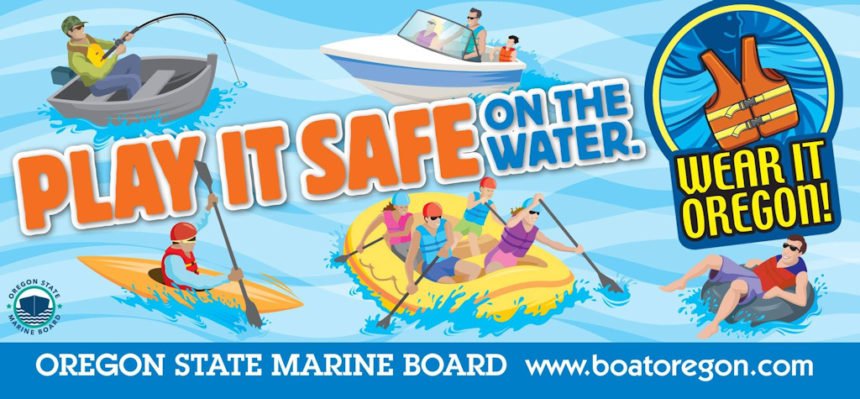Sharing Oregon waterways when boating: Improving safety, reducing conflict begins with you

SALEM, Ore. (KTVZ) -- The Oregon State Marine Board offers a different message this year heading into Memorial Day weekend, and it’s not just about safety. It’s about courteous behavior and recognizing that everyone on the water impacts each other.
Apply the “Golden Rule” and Understand Boating Needs of Others for Safety:
- Wherever paddlers are, motorized boat operators need to pay special attention to their speed, wake, and proximity to others. Let the paddler know you see them by changing course, speed, or using sound signaling.
- Paddlers are encouraged to stick together in your party (maintain a distance of 6 feet from others) and venture out into deeper or wider waterways ONLY when skill level and safety allow.
- Like any road with a crosswalk, paddlers are encouraged to cross river channels at 90-degree angles and make sure they have enough time to paddle across the waterbody safely and not impede motorboat traffic flow.
- When a motorboat operates “on plane,” at a faster speed, the boat may actually produce a smaller wake than at lower speeds. On shallow rivers, motorboats must remain on plane or risk grounding. Paddlers should keep their ears primed for the sound of a motorboat approaching and give way. Motorboat operators should be ready to steer clear or alter speed and signal to the other boaters that they are seen.
All boaters can do their part:
- It’s every boater’s responsibility to learn and follow the navigation “rules of the road.”
- Be mindful and conscious of your activity’s impact on others. At the boating facility, avoid congregating at the ramp or docks. Be efficient in launching and retrieving your boat.
- Be a good neighbor and look out for one another. If you see another boater in need, stop and render aid if you’re safely able to do so and stay on-scene until everyone is safe. Not only is this a courteous thing to do, but it’s also the law.
- Know your limits. Where there are a lot of people recreating, evaluate your skill level with the other activities, and gauge whether or not to do your activity in that location. Evaluate the level of risk due to COVID-19. Find a local area boat ramp to access the water. If it’s crowded, try again another day when it's less busy. If you’re new to boating, you may want to find a different waterbody nearby to hone your boating skills before venturing out into more densely populated waterways. Go with a more experienced friend or paddling club. This applies to both motorized boaters and paddlers.
- “See something, say something.” If someone is operating recklessly, take note of the make, model, and if possible, the boat’s OR number and file an electronic report. The Marine Board can follow up with a notice to Marine Law Enforcement.
- If you’re involved in a boating accident that involves an injury or property damage exceeding $2,000, you must report the incident to the Marine Board. A Boating Incident Report Form must be submitted within 48 hours of an injury or death and within 10 days of an accident causing property or equipment damage only.
Boating Safety for Memorial Day Weekend:
- Wear a life jacket. Make sure everyone is wearing a U.S. Coast Guard-approved life jacket. New innovative styles provide mobility and flexibility during water activities.
- Check equipment. Make sure you have and know how to use all the essential safety equipment.
- Make a float plan. Let family and friends know where you’re going and when you will return.
- Use an engine cutoff device. An engine cutoff device is a proven safety device to stop the boat’s engine should the operator unexpectedly fall overboard.
- Watch the weather. Always check the forecast before departing on the water and frequently during your excursion.
- Know what’s going on around you at all times. Nearly a quarter of nationally reported boating accidents in 2018 were caused by operator inattention or improper lookout.
- Know where you’re going and travel at safe speeds. Familiarize yourself with local boating proximity rules and slow -no wake zones and always travel at a safe speed. See the regulations here.
- Never boat under the influence. A BUII is involved in one-third of nationwide recreational boating fatalities. This includes alcohol, marijuana, prescription drugs, and inhalants.
- Keep in touch. Cell phones, satellite phones, EPIRB or personal locator beacon, and VHF radios can all be important devices in an emergency.
- Please follow COVID-19 guidelines for boating access sites (boat ramps, boarding docks, parking areas, etc.).
All boaters need to operate in a safe manner, be courteous to other users, share the water, and Take Care Out There.
For more resources, visit www.boatoregon.com.